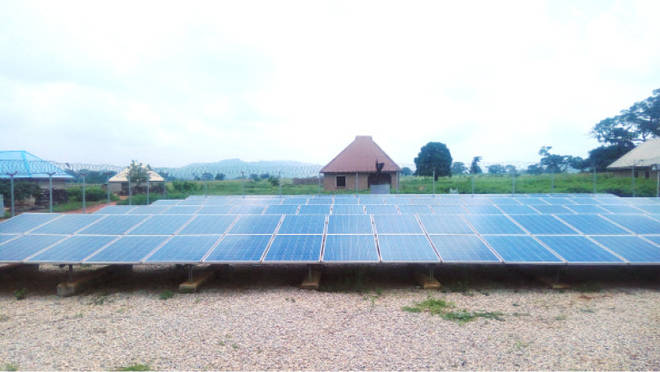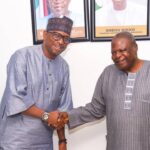
The quest for a sustainable environment by reducing harmful effects of emission of greenhouse gases and curtailing climate change caused by both natural and human activities is global but yet to achieve required success, especially in African countries.
The battle against earth’s depletion and its effects has led to the adoption of many international protocols that Nigeria is a signatory to. Renewable Energy programme is one of the many alternatives chosen to tackle the challenge of climate change.
Renewable energy is energy generated from natural sources such as sunlight, wind, rain, tides and geothermal heat and can be replenished.
The renewable energy programme, which began in Nigeria in February 2012, was formally launched in 2013 by Arc. Darius Ishaku when he was the supervising Minister of Environment.
As a result, the Federal Ministry of Environment put together the Renewable Energy Master Plan for Nigeria, initiated to fulfill its obligation as part of the African strategy on emission reduction and to address the challenges of moving towards clean, reliable, secure and competitive energy supply.
According to the plan, renewable energy technologies can also make indirect contributions to alleviating poverty by providing energy for cooking, space heating, lighting and contributing to education by providing electricity to schools.
The ministry also unveiled a programme tagged Rural Women Energy Security (RUWES) which is targeted at under-served rural women with the aim of ensuring affordable and sustainable clean energy access to the rural poor.
The programme suggested the widespread deployment of clean cooking stoves and solar lighting systems to rural women as improvements over traditional dirty fuel sources, which could also potentially help lessen adverse effect on human health, energy poverty, time and income savings and climate consequences.
However, the programme was marred by controversy over the importation of the clean cook stoves and as a result failed to attain desired goals.
Presently, the ministry is adopting measures to implement the green economy, which renewable energy is part of and it’s expected to provide energy to some universities in the country.
However a check by Daily Trust shows that renewable energy has remained an exclusive right of a few; average Nigerians, and especially rural dwellers, cannot afford to buy it.
A professor of Climatology at University of Lagos, Prof Emmanuel Oladipo, noted that the main factor why most Nigerians do not have access to renewable energy is that they are not aware of the values and potentials of renewable energy, adding that most of the things were done at the elitist level.
He added that for those who are aware, the major constraint is the initial cost, which is usually very high, particularly solar energy.
“You need a lot of capital to start it; the first factor is poor distribution system and inability of the authority to really make sure that people pay the correct prize. They don’t allow people to value the need of renewable energy except for those that are interested in providing alternative power for themselves,” he said.
The CEO of Consistent Energy and president of Renewable Energy Association of Nigeria, Segun Adaju, corroborated that the initial cost of setting up the technology is so high that people would rather buy a small generator of N30,000 and be buying fuel of 1,000 daily. He said in the long run the solar energy of the same generator size will cost about N400,000.
He however noted that another challenge is that some people feel that renewable energy cannot work due to some features that are done with poor quality system, and which has failed to power their equipment.
“The cost of doing business in Nigeria is high. In the long run the final cost to the customer is also high and they cannot afford it and the cost is because there are no incentives,” he said.
Adaju further said that recently the customs service started charging them for duty on solar panels, which was not in the system before, so this raised the cost of the products and customers now feel that the items are expensive.
According him, to make renewable energy available to the common man on the street, government needs to bring in a financing scheme where people can acquire energy and pay overtime, and make the business environment conducive.
“If government can create an enabling environment for the sector to grow then people will be able to afford it,” he said.
A director at the Nigeria Solar Capital Partners, Bolu Odusoya, attributed the low patronage and high cost of investing in solar energy to the difficulties in accessing loans from financial institutions in the country. He said the inaccessibility of loans and grants locked out investment in renewable energy systems.
He stressed that what was required is some government intervention where it will come up with fund to support the private sector by giving them grants or loans at concessionary rates. This if done, he said, will ensure that more renewable energy systems are used in private homes.
On the grid, he said government should select a new project out of the solar integrated energy plans and ensure that they are completed.
He said once those are in the system and generating power, they will reduce the perceived risk for other investors to bring in their money to invest in the country and therefore the cost of renewable energy will continue to go down
For Prof Oladipo, energy is very critical in Nigeria so government will have to come up more clearly to the commission in particular and Ministry of Power, Works and Housing so that people can appreciate the values and potentials of renewable energy and how it can help the country to meet its energy need.
The next stage, according to him, is how to make people have access to renewable energy, suggesting that government can employ micro-financing mechanisms through which civil servants will have government subsidised solar panels in their houses.
He said on a small scale, the microfinance mechanism can also work for small scale business owners like barbers and tailors by giving them the solar panels and inverters while they remit the money used for purchasing it daily, weekly or monthly depending on the framework agreed to by the stakeholders.
While noting that government has to find a way for investors to come in and start the production massively so that the prices come down, he said the energy commission is not playing its role as the power they provide in some communities was not enough to allow the people pump water, use air conditioners and other gadgets.
It could be recalled that the minister of State for Environment, Ibrahim Jibril Usman, paid a courtesy call to NASENI Solar Energy Ltd in Karshi, Abuja, in March last year, where the then substantive head of NASENI, Prof Mohammad Sani Haruna said: “The factory is operating at low capacity and cannot compete favourably with foreign products coming into the country in terms of prices until we are able to process raw materials locally for the production of solar PVs.”
He however noted that to crash the price, “We have to use the raw material locally to produce what we want. The price is expensive now because we import the solar set and we have outlined how to manufacture it locally with support from government.

 Join Daily Trust WhatsApp Community For Quick Access To News and Happenings Around You.
Join Daily Trust WhatsApp Community For Quick Access To News and Happenings Around You.


